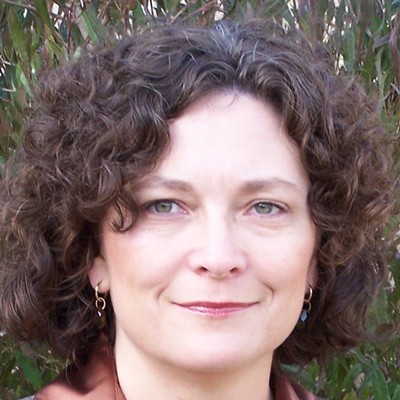The Bridge Initiative creates opportunities for women playwrights. For its next event, Bridge is partnering with Southwest Shakespeare Company to present the first reading of New York playwright Liz Duffy Adams’ newest work.
Tracy Liz Miller, who co-founded The Bridge Initiative in Mesa with Brenda Jean Foley in 2014, invited Adams to read a new work in Arizona after learning her play titled Or, would be opening Southwest Shakespeare Company's 2016-17 season at Mesa Arts Center. Both Miller and Foley moved from New York to Arizona several years ago, and still have connections to the New York City theater scene.
Although Adams' newest play wasn't written in Arizona, Miller says the reading is a great opportunity for local theater buffs to get a glimpse at how plays are taken from page to stage.
Presenting Adams' play is the latest project for The Bridge Initiative, which received a $6,000 Art Tank grant from Arizona Commission on the Arts in January 2015, after Miller and Foley pitched their idea with other artists and arts organizations before a live audience and panel of judges at Chandler Center for the Arts.
The pair pitched their plan to promote gender parity in theater by hosting an annual national playwriting contest for women, then shepherding each year's winning play from initial script to performance with a woman director at the helm.
“It’s important to develop female voices,” says Miller.
Historically, theater works written by men have dominated the theater landscape. The Bridge Initiative works to get more pieces by female playwrights developed, creating a bridge from initial writing to full stage production.
Although the Art Tank grant program no longer exists, due to decreased state funding of the arts, several organizations continue to leverage past Art Tank funding. Rising Youth Theatre, for example, used its 2014 Art Tank grant to create its innovative Light Rail Plays program, which continues to partner community members with theater professionals to create short plays that get performed on the local light-rail line.
Other theater groups to receive Art Tank funding include Childsplay, Orange Theatre, and Teatro Bravo. But The Bridge Initiative is the only grantee focused specifically on increasing opportunities for women theater professionals.
The free public reading for Adams’ Asterion happens at 7 p.m. on Monday, September 5, at the rehearsal space for Southwest Shakespeare Company, located at 55 East Main Street in Mesa (just west of Mesa Arts Center).
Other local groups involved with developing or producing new works include Phoenix Theatre, Theatre Artists Studio, and Arizona Theatre Company – which recently named Desi Moreno-Penson’s Beige the winner of its 2016 National Latino Playwriting Award.
Still, Miller says it’s rare for works written in Arizona to actually make it to an Arizona stage. The Pandora Festival presented by Arizona Women's Theatre Company presents readings of plays by Arizona women, but doesn't move works forward to full productions.
One notable exception is Riders of the Purple Sage composed by Phoenix-based Craig Bohmler. Arizona Opera performs the world premiere at Symphony Hall during March 2017.
For local audiences, the one-hour Asterion reading is a chance to go behind the scenes of a new theater work in development. For playwright Adams, it’s a way to gauge how well her words travel from page to stage, in part by noting viewer reactions to her work.
Adams wrote Asterion earlier this year, inspired by a man-made labyrinth in a Georgia forest, which she traversed while participating in an artist residency designed to foster works inspired by the local landscape.
It’s also rooted in Greek mythology, giving a new twist to familiar themes of family, sacrifice, and troubling circumstances. “I love monsters and catastrophic settings,” Adams says.
What happens when you’re born a monster in a labyrinth, rather than choosing to be there? Can you ever escape the labyrinth? And if so, how? Those are some of the questions explored through the characters and plot of Adams’ play, which Adams says she’s infused with humor and perspective.
The Bridge Initiative has taken some flack for not focusing solely on Arizona playwrights, Foley says. Its first playwriting contest winner was New York playwright Kat Ramsburg's Anatomy of a Hug. But looking at statistics for its past playwriting competitions reveals that only 10 percent or so of submissions to The Bridge Initiative come from Arizona playwrights.
In 2015, The Bridge Initiative received 103 submissions, including 12 works from a total of nine Arizona playwrights. This year, they had 163 submissions, including 12 from Arizona playwrights. Works are evaluated using several criteria, including storytelling, dialogue, and characters. And judges aren't told who wrote which piece, or where playwrights are based geographically.
Today, The Bridge Initiative is focused on funding the development and production of more new works by women, including the yet-to-be-announced winner of its 2016 competition, by launching a crowdfunding campaign and holding a gala fundraiser in November. And they’re working on becoming a 501(c)(3) nonprofit.
It’s all part of a larger picture, Foley says. “We want to create a space where women’s voices are valued and celebrated.”
[
{
"name": "Air - MediumRectangle - Inline Content - Mobile Display Size",
"component": "18478561",
"insertPoint": "2",
"requiredCountToDisplay": "2"
},{
"name": "Editor Picks",
"component": "16759093",
"insertPoint": "4",
"requiredCountToDisplay": "1"
},{
"name": "Inline Links",
"component": "17980324",
"insertPoint": "8th",
"startingPoint": 8,
"requiredCountToDisplay": "7",
"maxInsertions": 25
},{
"name": "Air - MediumRectangle - Combo - Inline Content",
"component": "16759092",
"insertPoint": "8th",
"startingPoint": 8,
"requiredCountToDisplay": "7",
"maxInsertions": 25
},{
"name": "Inline Links",
"component": "17980324",
"insertPoint": "8th",
"startingPoint": 12,
"requiredCountToDisplay": "11",
"maxInsertions": 24
},{
"name": "Air - Leaderboard Tower - Combo - Inline Content",
"component": "16759094",
"insertPoint": "8th",
"startingPoint": 12,
"requiredCountToDisplay": "11",
"maxInsertions": 24
}
]











